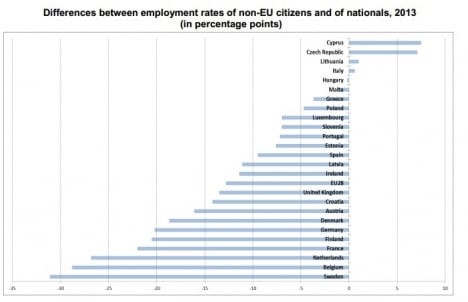IMMIGRATION
Danes more likely to get jobs than non-EU citizens
New Eurostat figures show that Denmark has the seventh highest gap in employment between citizens and foreigners from outside of the EU.
Published: 30 July 2014 14:03 CEST

Photo: Colourbox
Non-EU citizens are more likely to find work in 15 other European countries than in Denmark, new Eurostat figures released on Wednesday show.
Denmark’s employment rate for non-EU citizens in 2013 was 58.0 percent, slightly above the EU28 average of 56.1 percent but below the rate in 15 of the 25 countries that provided data. The employment rate for Danish citizens was 76.7 percent.
The -18.7 percent difference between the employment rate for Danish nationals and that of non-EU citizens was the seventh biggest gap in the EU. Sweden saw the biggest employment gap between nationals and non-EU citizens with a -31.1 percent difference.
Click image to view larger in pop-up
Denmark’s overall employment numbers were above the EU average for citizens, all foreigners, citizens of other EU Member States and non-EU citizens.
The 76.7 percent of Danish citizens who were employed in 2013 represented the fifth highest number in the EU, following Sweden (81.3 percent), Germany (78.7 percent), the Netherlands (77.3 percent) and Austria (76.8 percent). Greece had the lowest percentage of employed citizens at 53.4 percent.
As a whole, the unemployment rate for non-EU citizens in the EU28 was more than twice the level for citizens of the reporting country.
Url copied to clipboard!



 Please whitelist us to continue reading.
Please whitelist us to continue reading.
Member comments